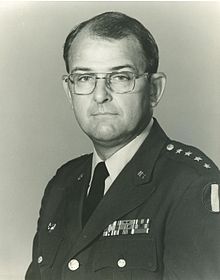Donn A. Starry
Donn Albert Starry (* 31 May 1925 in New York City ; † 26. August 2011 in Canton , Ohio ) was an American general of the US Army and military historian who, after the conflicts in Southeast Asia during the Vietnam War and the Cold War a doctrine of warfare for the US Army developed.
Life
Military training and corps commander in Germany
Starry grew up in Kansas City , where his father company commander of the National Guard of Kansas was. As a child he and his father took part in training camps at Fort Riley , where he developed a deep admiration for the officers of the cavalry , who first looked after their horses, then others, and finally themselves. In 1931, at the age of six, he became an Honorary Lieutenant in the Kansas National Guard and later participated in rodeo competitions in Kansas City as a youth .
In 1943 he joined the US Army and completed his training at the US Military Academy in West Point (New York) in 1948 . He later completed a degree in international relations at George Washington University , graduating with a Master of Arts (MA International Affairs).
He then rose during the Cold War within the US Army and later took over commanding posts in the Federal Republic of Germany and as commander of the 11th Armored Cavalry Regiment (11th Armored Cavalry Regiment) from 1969 to 1973 during the Vietnam War. For his heroic deed on May 5, 1970 during the invasion of Cambodia , he was awarded the Soldier's Medal. On this day he saved the future General Frederick M. Franks junior , who was also the commander of TRADOC between 1991 and 1994, from a shell by the North Vietnamese artillery . He was injured in the chest himself, while Franks lost a leg but remained alive. Afterwards the two phoned each year on May 5th and called themselves "the friends of the Fifth of May".
From 1973 to 1976 he was first commander of the US Army Armor School in Fort Benning , before he was then commanding general of the V US Corps in Heidelberg .
Commander of the TRADOC and AirLand Battle Doctrine
On July 1, 1977, Starry was appointed commander of the United States Army Training and Doctrine Command (TRADOC) at Fort Monroe and was only the second commander of this so-called Major Command, which was only established in July 1973, after General William E. DePuy .
In this use he developed the AirLand Battle Doctrine , a strategy developed from the Cold War for confrontation with the Soviet Union and the states of the Eastern Bloc . Prior to the development of this doctrine , the US Army operated on a strategy known as the Active Defense Doctrine. This was based on the concept of a small, but highly technical and agile armed force that could repel the first wave of a large-scale conventional attack by the Soviet Union in Western Europe .
Starry redesigned this strategy: As the name of the strategy suggests, air and land forces were integrated into his plan. In addition, the AirLand Battle Doctrine enlarged the battlefield and looked beyond the war front , where attack helicopters and precision-guided ammunition would attack the enemy from behind.
As Commander of TRADOC, he also founded the Combat Studies Institute at Fort Leavenworth before becoming Commander of US Readiness Command on August 1, 1981 at MacDill Air Force Base , which prepared Army and Air Force units for overseas missions. In 1983 he was adopted into retirement.
In the course of his military career, Starry was awarded several other medals, including the Defense Distinguished Service Medal, the Distinguished Service Medal twice, the Silver Star , the Legion of Merit three times , the Bronze Star and the Purple Heart .
Its air-land battle doctrine came in the early 1990s years in the Second Gulf War in the Persian Gulf successfully used, as US forces, the Iraqi overpowered army. The doctrine developed by Starry was only later overtaken by the war on terror due to the changing conduct of warfare and the increase in the counter-insurgency.
Starry died of complications from a rare cancer . In a tribute, the director of the US Army Military History Institute, Conrad Crane, described him as one of the "intellectual giants who turned the US Army inside out in Vietnam".
Awards
Selection of decorations, sorted based on the Order of Precedence of Military Awards :
-
 Defense Distinguished Service Medal
Defense Distinguished Service Medal
-
 Army Distinguished Service Medal (2 ×)
Army Distinguished Service Medal (2 ×) -
 Silver Star
Silver Star
-
 Legion of Merit (3 ×)
Legion of Merit (3 ×) -
 Distinguished Flying Cross
Distinguished Flying Cross
-
 Soldier's Medal
Soldier's Medal
-
 Bronze star
Bronze star
-
 Purple heart
Purple heart
-
 Air Medal (10 ×)
Air Medal (10 ×) -
 Joint Service Commendation Medal (2 ×)
Joint Service Commendation Medal (2 ×) -
 Army Commendation Medal
Army Commendation Medal
Publications
- Mounted Combat In Vietnam , Vietnam Studies 1989, Department of the Army
Web links
| personal data | |
|---|---|
| SURNAME | Starry, Donn A. |
| ALTERNATIVE NAMES | Starry, Donn Albert (full name) |
| BRIEF DESCRIPTION | American military, general in the US Army |
| DATE OF BIRTH | May 31, 1925 |
| PLACE OF BIRTH | New York City |
| DATE OF DEATH | August 26, 2011 |
| Place of death | Canton , Ohio |
